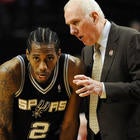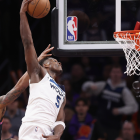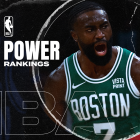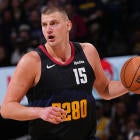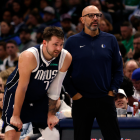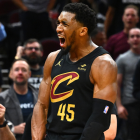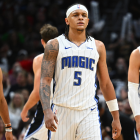Death. Taxes. Spurs.
That's what we always say after the Spurs rattle off another 55-plus win season. The sustained, consistent success of the Spurs under Gregg Popovich is absurd.
- The Spurs have won 50-plus games (or were at a 50-win pace in lockout seasons) in 20 consecutive seasons, and 25 of the past 28.
- They have not missed the playoffs since 1997, and have only missed the postseason five times in franchise history.
- Oh, and there's that whole "five NBA championships" thing.
Even though 2002 results have nothing to do with the 2017-18 season, the Spurs are expected to be the second seed in the West, just because, well, "death, taxes, Spurs." Yet there are growing whispers. ...
"They didn't add anyone of real impact this summer, and they lost a bunch of guys."
"The West is way better. Can they really be as good again?"
"Aren't they due for a fall-off? I mean, we always say that, but seriously, aren't they due?"
So let's dig into this, and figure out where exactly this Spurs team lies.
Why Spurs will be elite: They're the Spurs
It's easy to rattle off those numbers above and drop the mic. The Spurs will be great because they've been great for the past 20 years. In the Popovich era, they have registered more than 55 wins a stunning 14 times. More than 55 wins at least gets them in the conversation for the West's 2-seed this upcoming season. It's true that the 2-seed in the Warriors Era has had more than 60 wins in two of the three seasons ... but those two were San Antonio.
There's more to it than that, though. To simply say "the Spurs have won these games" ignores how they won them. And that gets into the nature of the NBA's regular season.
The Spurs have maintained a 55-win pace despite multiple changes over the years. They had a defensive-first squad in the early-to-mid-2000s, a grind-it-out game regarded among the league's most boring. They evolved into a hyper ball-movement system that accommodated their aging star core, while developing Kawhi Leonard. They ushered in what is known as the "beautiful game," which was emulated and adopted by the Warriors.
They have seen all these changes, and the loss of Tim Duncan and other key players, yet always maintained that high win percentage. But how?
There's a nasty secret often overlooked in a league so driven by stars: If you play the right way, you play consistently and you have at least one star and a few plus players, you will rack up regular-season wins. The Spurs aren't the most talented team in the league, but they are the most consistent.
Here's a look at statistical variance of six teams' 82 games last season in offensive and defensive efficiency. In other words, how wide were the range of outcomes across all the games on offense and defense? A lower score indicates more consistency, a higher score indicates a more inconsistent set of outcomes. This is not relative to performance, i.e., if you were a bad team every game, your score would be low just as if your performance was good most games.
Team | Offensive variance | Defensive variance |
Spurs | 106.42 | 90.00 |
193.11 | 136.12 | |
Rockets | 107.24 | 123.15 |
Warriors | 134.70 | 100.31 |
Nets | 119.31 | 108.66 |
Blazers | 138.88 | 133.80 |
You'll notice the Spurs' variance was considerably lower than these other teams. This is meant to provide a snapshot, given that this includes the best and worst teams. The Nets, who were consistently bad at both ends, had a lower variance in efficiency than a team like Portland, who would look great some nights, and awful the next. But the Spurs were a steady hand. Their highs were not as high as the Warriors, but their lows were greater than Golden State's lows.
The Spurs were one of the most consistent teams night to night on both ends of the floor. They didn't rely on playing their best on offense or defense, they just played the same way night after night.
On top of their efficiency consistency, the Spurs have been a top-15 team in turnover percentage (as in, among the 15 teams committing the fewest turnovers) since 2003. Most seasons they've been top 10. It's positively crazy that they haven't had a single season where they were in the back half of the league in turnovers for 14 years.
High efficiency, low turnovers, consistency in performance and approach -- this is tried and true. These numbers are the result of their process -- always striving for balance, discipline and precision. The Spurs don't go with wild game plans or lineups. Popovich doesn't reinvent the sport each time his team takes the floor; in the regular season, he rarely even cares about the final score.
The Spurs always have a formula, as long as Popovich is sharp and Kawhi Leonard is among the league's five best players, to pile up wins. No ship will be as steady as San Antonio, no team psyche as stable. They will continue to be the second-best team behind the Warriors by virtue of their unwavering system.
Why Spurs will slip: It's basketball, not mysticism
San Antonio overachieved last season. Popovich criticized the team routinely, saying the team "wasn't where they wanted to be" in January. Yes, they racked up wins, including an 11-2 record vs. the Warriors, Cavs, Rockets, Celtics and Raptors. And yes, their net point differential per-100 possessions was a firm second. But at some point you have to move beyond those numbers and face some facts.
The Spurs have the least firepower of any major contender. Leonard is their lone All-Star, and carries the team. LaMarcus Aldridge's impact has slid in a big way. This summer they lost valuable contributors in Jonathon Simmons and Dewayne Dedmon in free agency, instead choosing to provide Pau Gasol with an expensive multiyear deal. Tony Parker is out indefinitely, and turns 36 next spring. Manu Ginobili is 40. Pau Gasol is 37. Danny Green just crossed 30.
The list goes on and on. The Spurs will find young guys to fill in; that's another ingredient in their formula. Bryn Forbes, Brandon Paul, Davis Bertans -- one of the lesser-known guys will gain momentum as the season goes on. Ginobili will still nutmeg a few guys, Green is still one of the league's best defensive players. Gasol and Aldridge are still... well, tall. Dejounte Murray looks like a real stud.
But if this roster played for any other franchise in the league -- literally any other squad -- the conversation would center around Leonard's wasted prime, and how the Gasol was fooishly handed a multiyear deal. They would be seen as a playoff team, but battling for a mid-tier seed. It's not that they don't have good players, they're just awfully short on great players. Their three highest scorers after Leonard last season were Aldridge (17.1 ppg), Gasol (12.4) and Parker (10.1), all older than 30. Patty Mills, fifth on the team at 9.5 ppg, has averaged double-digit scoring only twice in an eight-year career.
Leonard is a singular talent at both ends of the floor, and the deeper you examine how he pulled this team together last season, the stronger his MVP season resume looks. That doesn't alter the big picture view of the roster. Consistency and formula can only last so long at such a high level.
And the Spurs are not invincible. In 2015, they fell to the sixth seed despite winning 55 games. With so many good teams in the West this upcoming season, a similar result is conceivable. The Spurs have had seeds lower than two throughout this dominant stretch. A fall from elite status in the West still means you can win 55-plus games.
That could be the most important part of this discussion; the Spurs are headed in the opposite direction from the rest of the West, which has loaded up and is as good as it ever has been. Every contender aside from San Antonio is stacked with multiple stars. Sure, the Spurs have the advantage in system and consistency, but if those other teams adapt those elements even in lesser degrees, their talent will put them above San Antonio.
The verdict: Spurs still gonna Spur
It's entirely possible that San Antonio isn't the 2-seed next season. So what? Does that make them less dangerous? Put it this way. The Rockets had more talent and were playing better basketball. They were more efficient offensively, spreading out the Spurs' slow shooters with the ability to run on them, and walloped San Antonio in Game 1 of their second-round matchup. The Spurs rallied to win in six, despite Leonard's injury (that ankle injury changed the entire momentum and complexion of the series, but that's another story for another day). They beat Houston, on the road, without their best player.
The Spurs always find a way, against everyone but the very best. Last season was not a total anomaly, either. The 2008 Hornets were a better team than the Spurs, outplayed them for the majority of their series, and San Antonio outlasted the Hornets in seven before the Lakers simply outclassed San Antonio in the Western Conference finals.
Even if the Spurs aren't the 2-seed or don't win 60 games next season (and they could), it won't change how dangerous they'll be. What that says about the NBA is the important thing. If you have an exceptional, MVP-level talent, a system well designed, and most important, an organization that maintains discipline, consistency and trust in the locker room, you are going to have a serious shot vs. anyone.
Except maybe the Warriors.













